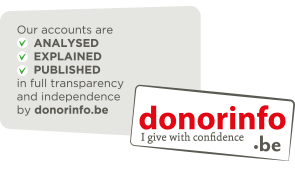Victoria Lawson has been a dedicated Serve the City volunteer for almost three years (and counting!) and has become one of our most appreciated project leaders. She has been a precious addition to our project leader group at Lunch 4 All, where we usually see her every Tuesday leading the distribution and helping to provide food to more than 400 homeless people. But not only that! She has also helped us restart the Hama 4 project, a long-ago initiative that was forced to stop during the pandemic and that provides companionship and support to elderly individuals with intellectual disabilities.
Beyond her hands-on work, Victoria is also committed to raising awareness about Serve the City’s mission and inspiring others to join our cause.
How did you become interested in volunteering?
VL: I had always heard about Serve the City, and I’ve always been interested in volunteering, but I never really knew where to go. I was also a bit hesitant about my French. But when my daughter left for university in England, I felt like I wanted to do something more and fill my time. I started with food portioning, which was a gentle introduction. I wasn’t sure I was ready to meet the beneficiaries, because I didn’t know what to expect or how I’d feel. I also wondered if I’d be safe. So, food portioning felt like a good start. I also did a little bit of cooking, which was tiring but fun. After that, I joined Lunch 4 All, and it has been wonderful.
You’ve been volunteering for about two years now. What have you learned from volunteering?
VL: Personally, I’ve gained a lot of self-confidence. I’ve realized that my French is better than I thought (laughs). I’ve also learned not to be afraid or intimidated by the people I see on the street. I’ve really challenged myself. For example, I’m now running a small project for people with intellectual disabilities—something I never thought I could do. It’s been so fulfilling and joyful. I really enjoy it.
When did you become a project leader?
VL: I’m not sure exactly when it happened, but it was probably about a year ago. I remember it was around the time I took on a leadership role for Lunch 4 All.
For Lunch 4 All?
VL: Yes, for Lunch 4 All. I think I became a project leader about a year ago. Then, I told Nathan and Anna that I could take on a bit more responsibility. They asked me what I wanted to do, and they mentioned several projects. I chose Hama 4, and I’ve been working on it since March.
What have you learned from running Hama 4? How does it compare to Lunch 4 All, and what differences have you noticed as a project leader?
VL: Hama 4 is much smaller—only three volunteers go once a week. It’s also entirely in French, whereas Lunch 4 All is mainly in English. Most of the residents at the care home speak French or Dutch, with French being the most common, so we communicate in French. Through Hama 4, I’ve learned a lot about intellectual disabilities—particularly about people with severe disabilities. I’ve gotten to know them as individuals. It’s been a real revelation for me. People with intellectual disabilities often don’t get the chance to show their personalities, and what I’ve learned is that they’re adults with their own lives, histories, and experiences. It’s been wonderful to see them as friends. Restarting the project was a bit daunting because I didn’t think anyone would join me. I was on my own for the first two months. I had to write the project description, coordinate with volunteers, and support them with any questions. I never thought I could do all that, so I’ve learned a lot about myself along the way. And I’ve met some really nice people.
What have been the biggest challenges you’ve faced in these projects?
VL: In Hama 4, I wouldn’t call it a difficulty, but it was a challenge to recruit volunteers. At one point, I thought no one would join me, and I’d be doing it alone forever. That was a bit discouraging. Another challenge was earning the trust of the staff at Hama 4, many of whom have been working there for 20-25 years. They’re professionals, and as a volunteer, I had to prove that I could be helpful without overstepping. But I think we’ve managed to build a good relationship. We now have a team of nice, positive volunteers, which has helped us show the Hama 4 staff what we can do. With Lunch 4 All, I was lucky because everything was already set up. Alison, the other project leader, is lovely. But it’s physically demanding—lifting boxes, running around all the time. It can be a challenge, but it’s also really sociable and rewarding.

Have you encountered any stories from the beneficiaries that still resonate with you?
VL: Yes, there’s one chap at Hama 4 who once told me he had been in the Olympics. I didn’t quite understand at first, but he said he had run and possibly thrown the javelin. Later, when I mentioned this to one of the carers, she told me that he had competed in the Special Olympics and won medals. It really struck me. Here was someone with a disability who had done amazing things in his life—things you wouldn’t expect because of the image we have of people with disabilities. It was a big revelation for me.
How do these kinds of stories impact your day-to-day life, outside of Hama 4?
VL: My mother had dementia, and she got quite ill, which was difficult for me. I think that experience helped me relate to people with intellectual disabilities because I was already familiar with how people’s conditions can affect their lives. Overall, I’ve become more open and empathetic. I don’t feel sorry for people anymore, which I might have done before. Now, I just see them as people with a different way of perceiving the world. That’s probably the biggest difference for me.
How long have you been a volunteer with Serve the City, and what initially drew you to the organization?
VL: I’ve been volunteering with Serve the City for about two and a half years. Initially, I was drawn to it because I had heard about it for a long time, and it was in English, which was a big help as I still felt at the time that my French wasn’t the best, I also really like the Serve the City app. It makes volunteering easy to organize, and if you have a busy life, it’s very flexible. That was really important to me. There are so many different projects, so I was able to try different things until I found what I really liked.
Why do you think volunteering is important?
VL: Volunteering is essential because civil society alone can’t meet all the needs. For young people, it’s a fantastic opportunity to interact with diverse groups, build communication skills, and boost confidence. Unlike paid work, volunteering offers freedom—you can come and go as you please while discovering your strengths.
It’s also incredibly valuable for those who feel lonely, providing a meaningful way to connect with others. Serve the City is especially beneficial for expats, helping them integrate into life in Belgium. In many countries, governments simply lack the capacity to offer the support that’s needed, making volunteering even more critical.
What is your favorite thing about volunteering?
VL: The people. That’s definitely the best part. I get to meet all kinds of people, from young to old, from different walks of life, from different countries. Their experiences are really fascinating. It’s so fun to connect with people from all over.
What impact do you think volunteering has on the people you help?
VL: I hope that it’s positive. I hope that the people we help see a friendly face. It doesn’t matter if you’re handing out care bags or visiting someone; it’s the connection you make that counts. I always tell volunteers, especially in Lunch4All, that the most important thing is to smile. If you smile, you’ll get a smile back. What you put in is small compared to what you get back. Smiling humanizes people, and it creates a connection that’s really meaningful.







